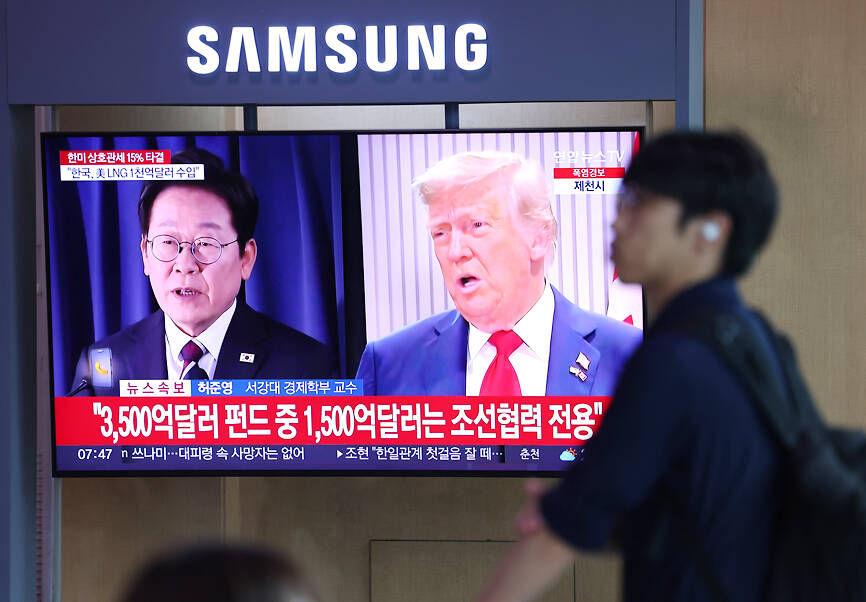US President Donald Trump on Wednesday said that the US would impose a 15 percent tariff on imports from South Korea, as he touted a “full and complete trade deal” between the two countries.
“South Korea will give to the United States US$350 Billion Dollars for Investments,” Trump said in a post on his Truth Social platform, adding that the country would buy US$100 billion in liquefied natural gas or other energy products.
The 15 percent rate is below a 25 percent tariff that Trump had threatened earlier, and was equivalent to deals with Japan and the EU.

Photo: EPA/ YONHAP
Trump added that Seoul would invest an additional unspecified “large sum of money.”
“This sum will be announced within the next two weeks when the President of South Korea, Lee Jae-myung, comes to the White House for a Bilateral Meeting,” Trump said, offering congratulations to his South Korean counterpart for his “electoral success.”
South Korean Minister of Finance Koo Yun-cheol said Seoul’s commitment to help the US revive its shipbuilding industry was instrumental in reaching the deal.
“I believe MASGA made the greatest contribution to reaching today’s agreement,” Koo said at a news conference in Washington, referring to the “Make American Shipbuilding Great Again” proposal.
“Our world-class shipbuilding companies, equipped with the highest level of ship design and construction capabilities, are expected to help revive the US shipbuilding industry,” he said.
News of the deal with South Korea came as Trump on Wednesday imposed 25 percent tariffs on Indian goods and 50 percent on those from Brazil.
The leaders’ White House meeting would be their first since Lee assumed the presidency in June.
In a statement on Facebook, Lee called the deal “the first major trade challenge” since his administration took power, adding: “We have overcome a major hurdle.”
“Through this deal, the government has eliminated uncertainty surrounding export conditions and ensured that US tariffs on our exports are either lower than or equal to those imposed on our major trade competitors,” he said.
Lee was elected in a snap vote in June following the impeachment of his predecessor, Yoon Suk-yeol, over his disastrous martial law declaration in December last year.
The deal marks an early victory for Lee’s tenure as head of the export-reliant economy, Asia’s fourth biggest.
“This agreement represents the convergence of US interests in revitalizing its manufacturing sector and our determination to strengthen Korean companies’ competitiveness in the American market,” Lee’s statement continued.
There were mixed reactions in South Korea. Its six major business associations, including the Korea Chamber of Commerce, said in a joint statement: “We view this agreement as a critical milestone that will not only ease trade-related uncertainties, but also pave the way for a significant strengthening of economic cooperation between the two countries.
“With much of the external uncertainty now resolved, the [South] Korean business community will redouble efforts to boost domestic investment and job creation,” they said.
A handful of civic groups, including farmers and labor organizations, protested at the US embassy in central Seoul, opposing “Trump’s madman strategy.”
Demonstrators held signs reading “No Trump! No King!” and pointed out that there might be additional negotiations when Lee meets Trump.
“Trump’s actions amount to excessive interference in our domestic affairs,” Korean Apple Growers Association head Park Sung-hoon said.

SETBACK: Apple’s India iPhone push has been disrupted after Foxconn recalled hundreds of Chinese engineers, amid Beijing’s attempts to curb tech transfers Apple Inc assembly partner Hon Hai Precision Industry Co (鴻海精密), also known internationally as Foxconn Technology Group (富士康科技集團), has recalled about 300 Chinese engineers from a factory in India, the latest setback for the iPhone maker’s push to rapidly expand in the country. The extraction of Chinese workers from the factory of Yuzhan Technology (India) Private Ltd, a Hon Hai component unit, in southern Tamil Nadu state, is the second such move in a few months. The company has started flying in Taiwanese engineers to replace staff leaving, people familiar with the matter said, asking not to be named, as the

The prices of gasoline and diesel at domestic fuel stations are to rise NT$0.1 and NT$0.4 per liter this week respectively, after international crude oil prices rose last week, CPC Corp, Taiwan (台灣中油) and Formosa Petrochemical Corp (台塑石化) announced yesterday. Effective today, gasoline prices at CPC and Formosa stations are to rise to NT$27.3, NT$28.8 and NT$30.8 per liter for 92, 95 and 98-octane unleaded gasoline respectively, the companies said in separate statements. The price of premium diesel is to rise to NT$26.2 per liter at CPC stations and NT$26 at Formosa pumps, they said. The announcements came after international crude oil prices

SinoPac Financial Holdings Co (永豐金控) is weighing whether to add a life insurance business to its portfolio, but would tread cautiously after completing three acquisitions in quick succession, president Stanley Chu (朱士廷) said yesterday. “We are carefully considering whether life insurance should play a role in SinoPac’s business map,” Chu told reporters ahead of an earnings conference. “Our priority is to ensure the success of the deals we have already made, even though we are tracking some possible targets.” Local media have reported that Mercuries Life Insurance Co (三商美邦人壽), which is seeking buyers amid financial strains, has invited three financial

CAUTION: Right now, artificial intelligence runs on faith, not productivity and eventually, the risk of a bubble will emerge,’ TIER economist Gordon Sun said Taiwanese manufacturers turned more optimistic last month, ending a five-month streak of declining sentiment as concerns over US tariffs, currency volatility and China’s overcapacity began to ease, the Taiwan Institute of Economic Research (TIER) said yesterday. The manufacturing business confidence index rose 1.17 points from June to 86.8, its first rebound since February. TIER economist Gordon Sun (孫明德) attributed the uptick to fading trade uncertainties, a steadier New Taiwan dollar and reduced competitive pressure from Chinese producers. Taiwan’s semiconductor industry is unlikely to face significant damage from Washington’s ongoing probe into semiconductors, given the US’ reliance on Taiwanese chips to power artificial